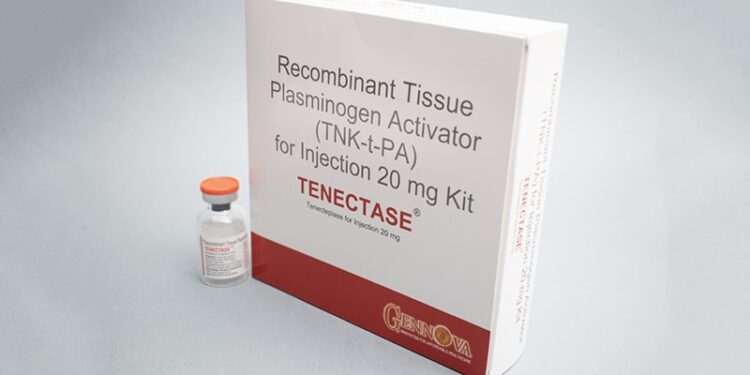HELSINKI — In patients with large vessel occlusion stroke treated within 4.5 hours of symptom onset, outcomes were better in those who received the thrombolytic tenecteplase prior to endovascular therapy than in those who underwent endovascular treatment alone.
Results from the BRIDGE-TNK trial showed that patients who received tenecteplase had a significantly higher likelihood of achieving functional independence at day 90.
Several earlier trials of thrombolysis before endovascular therapy — most using alteplase as the thrombolytic — failed to show significant benefit. Commentators now suggest that the latest findings from the BRIDGE-TNK trial suggested tenecteplase may potentially be a more suitable agent in this clinical scenario.
“Essentially, what our trial showed was that patients who received tenecteplase before endovascular therapy did better than those who did not receive tenecteplase. And it was a highly significant result, supporting the idea that we should give tenecteplase to these patients who are presenting directly to endovascular centers. All patients in this trial were directly presenting to the endovascular center,” said study investigator Thanh Nguyen, MD, director of Interventional Neurology/Neuroradiology at Boston Medical Center, Boston.
The BRIDGE-TNK trial results were presented on May 21 at the European Stroke Organization Conference (ESOC) 2025 and simultaneously published online in The New England Journal of Medicine.
Better Functional Independence
The open-label BRIDGE-TNK trial included 550 patients with acute ischemic stroke due to large-vessel occlusion who presented within 4.5 hours of symptom onset and were eligible for thrombolysis. Patients were randomly assigned to receive either intravenous tenecteplase followed by endovascular thrombectomy or endovascular thrombectomy alone.
The primary outcome was functional independence at 90 days, measured on a scale from 0 to 6, with higher scores indicating greater disability. Secondary outcomes included successful reperfusion before and after thrombectomy. Safety outcomes assessed symptomatic intracranial hemorrhage within 48 hours and death within 90 days.
At 90 days, functional independence — defined as a score of 0-2 on the modified Rankin Scale — was achieved in 52.9% of patients in the tenecteplase-thrombectomy group compared with 44.1% in the thrombectomy-alone group (unadjusted risk ratio, 1.20; 95% CI, 1.01-1.43; P = .04).
The time between tenecteplase administration and the start of endovascular therapy was very short — a median of 16 minutes — yet there was still a significant increase in successful reperfusion before thrombectomy in the tenecteplase group (6.1%) vs thrombectomy-alone group (1.1%). Successful reperfusion after thrombectomy occurred in 91.4% of patients in the tenecteplase group and 94.1% in the thrombectomy-alone group.
Symptomatic intracranial hemorrhage within 48 hours occurred in 8.5% of patients in the tenecteplase-thrombectomy group and 6.7% in the thrombectomy-alone group — a nonsignificant difference. Ninety-day mortality was 22.3% in the tenecteplase group vs 19.9% in the thrombectomy-alone group.
Peter Kelly, MD, professor of neurology at University College Dublin in Dublin, Ireland, who was not involved in the trial, asked Nguyen how the BRIDGE-TNK results should be interpreted in light of previous, “perhaps inconclusive,” alteplase trials — and why the signals appear to differ between the two agents.
Nguyen said that an individual patient meta-analysis of the alteplase trials suggested a potential benefit of administering the drug before thrombectomy in patients treated very early — within 2.5 hours of symptom onset. However, beyond that time window, the benefit appeared to plateau, with no clear advantage observed.
“I think it depends on what you have available at your hospital. So, if you have alteplase, then you use alteplase. If you have tenecteplase, you use tenecteplase. But if you have the choice between the two, then it would seem reasonable to go with tenecteplase because it’s showing superiority over the whole 4.5-hour time window,” Nguyen added.
Discussing why tenecteplase may be more effective than alteplase in this setting, Nguyen explained that tenecteplase is more fibrin-specific and has been associated with better recanalization outcomes.
She added that its bolus administration makes it faster and more convenient than alteplase, which requires an infusion — an important advantage when time is critical for getting patients to the cath lab.
Kelly responded: “So it might be as simple as that; perhaps it’s all down to speed again.” He concluded: “I think the main take home message is not to withhold thrombolytics in patients with large vessel occlusion stroke on the way to endovascular therapy.”
In response, Kelly suggested the difference in outcomes might simply come down to timing. “I think the main take-home message is not to withhold thrombolytics in patients with large vessel occlusion stroke on the way to endovascular therapy. So, it might be as simple as that; perhaps it’s all down to speed again,” he said.
A Convincing, Positive Result
Commenting on the study for Medscape Medical News, Michael Hill, MD, director of the Stroke Unit for the Calgary Stroke Program, Alberta, Canada, said the results supported the use of thrombolysis before endovascular therapy.
“A meta-analysis of alteplase trials in this situation has suggested a benefit, but this trial with tenecteplase shows a more convincing positive result. This is consistent with previous literature suggesting that tenecteplase may be a more effective thrombolytic agent than alteplase and associated with earlier recanalization.”
He suggested that the benefit of thrombolysis before thrombectomy may not just be due to the earlier opening of the vessel.
“The endovascular procedure can cause some distal embolization into the far parts of the circulation, so having a drug on board, which is going to help manage those microcirculatory occlusions should be beneficial. But that’s still theoretical at present,” Hill said.
“I think the totality of the alteplase data also suggest that it is beneficial, but tenecteplase could be better, so we should be giving tenecteplase to these patients heading for endovascular therapy,” he added.
Hill noted that many regions around the world have already adopted tenecteplase as the thrombolytic of choice for stroke treatment.
The BRIDGE-TNK trial was funded by the Chongqing Science and Health Joint Medical Research Project; the Second Affiliated Hospital of Army Medical University; and China Shijiazhuang Pharmaceutical Company Recomgen Pharmaceutical (Guangzhou).
Source link : https://www.medscape.com/viewarticle/tenecteplase-before-thrombectomy-improves-large-vessel-2025a1000d6n?src=rss
Author :
Publish date : 2025-05-26 10:12:00
Copyright for syndicated content belongs to the linked Source.














